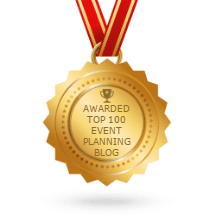As many businesses continue to carefully examine their budgets to ensure they’re getting the best return on investments, event marketers are honing in on their strategies and using data to make important decisions. More traditional metrics, such as ticket or sponsorship revenue, or even just brand awareness are often not enough to determine if an event marketing spend is the right one. That’s where the 5 P’s of event marketing come into play and can help you develop the right event marketing strategy.
Keep reading as we dive into the elements of the 5 P’s and how you can leverage InGo to hone your event marketing strategy and create successful events.
What are the 5 P’s of Marketing?
Also referred to as a “marketing mix,” the 5 P’s of marketing are elements that decision makers can use to meet customer needs, add value to their business, and help them stay competitive. While there are some variations on each individual “P,” depending on the industry, we’ll explore the most commonly used elements of the event marketing mix.
- Product
The product refers to the event itself and what your business is offering. It’s important to highlight the unique features, content, benefits, and more to entice potential attendees to come to your event. You’ll also want to be sure that your event is meeting a need or solving a problem for your target audience. Consider things like the history of the event, and the unique value you’re bringing to a topic or focus area to help streamline your marketing strategy. When you have a clear understanding of your event and how it benefits your target audience, you’ll make it that much easier to help your speakers, sponsors, and attendees to promote your event using a platform like InGo.
- Price
Figuring out how much to charge for an event involves several factors such as the cost of running the event (venue, food, keynote speakers, advertisement/promotions, etc.), how you’ve positioned your business in the marketplace, the cost of attendee acquisition, your goals for the event, and more. For example, if you’re spending $50 to acquire an attendee, you’ll want to make sure you charge more than that to make a profit. And with the cost of acquiring new attendees on the rise, this can be an important metric in determining your marketing budget and ROI for the event. Additional factors to consider include the perceived value of an event as well as what your target audience can pay. For example, if you’re positioning your event as a high-end gala, your attendees will expect to pay more to attend as they perceive it as a luxury event that will come with top-notch content. You’ll also want to factor in elements such as discount pricing or specials you’re offering your attendees when determining the right price to charge.
- Promotion
Promoting an event is a critical piece of the marketing mix. After all, if no one knows about it, no one will show up! There are as many promotional routes to take as there types of events out there, from social media marketing to press releases to paid advertisements to referral marketing. The key is carefully weighing which tactic will work best for your business and help you reach your goals for the event. Choosing a platform like InGo can take a huge burden off your shoulders for event marketing. You can empower your speakers, sponsors, and attendees to be your best marketers by influencing their connections to attend your event through the power of social media. Marketers must also consider what the brand’s message is and how it resonates and connects with the target audience. For example, how you talk to potential attendees for a fundraising event for animal shelters will be very different from a corporate audience concerned with data analysis. But ultimately, effective event marketing is an ongoing effort that seizes on the right opportunities to promote the event to the right people, at the right time, in the right way.
- Place
Where your event is being held can influence how many people attend as well as the energy and overall personality of the event. For example, if you’re holding an event at a luxury resort, that could be a key part of the marketing strategy and a draw for many attendees. On the other hand, if you’re organizing a corporate event at a hotel, you may want to promote the convenience or accessibility of the location, rather than the venue itself. And with the COVID pandemic, event planners now also have to consider whether to hold an event in-person, virtually, or host a hybrid event. Wherever you choose to hold your event, know that it can be a key part of your marketing strategy.
- People
We’ve saved the most important “P” for last: people! After all, without people, an event doesn’t really happen – from the attendees to event staff. People can, and should, also play a critical role in your event planning and marketing. When you’re first planning an event, you want to consider who the event is for, and what benefit you’re hoping to offer them. Once you’ve determined that, you’ll build everything else around that. Ensuring that your event offers compelling and useful content to your audience is one major way to have a successful event.
Another method to ensure a successful event is leveraging the power of people and their connections. In this context, we’re referring to the spider web of connections that every individual (and prospective attendee) has. Social media platforms like LinkedIn and Instagram are built on connections and can be invaluable in marketing your event and boosting attendance. That’s why at InGo, we’ve built our platform around the power of connections and have figured out how to leverage this easily and quickly to get real results from your event.
And there you have it, the 5 P’s of event marketing. By factoring these elements into your event planning and marketing strategy, you can ensure you get ideal attendance numbers, effectively promote your event, and get the biggest ROI possible. And InGo can help you along the way, whether you’re planning a physical, virtual, or hybrid event. We can help you solve the biggest event marketing challenges and drive more attendees and engagement. Visit ingo.me to learn more or contact us to schedule a demo.


